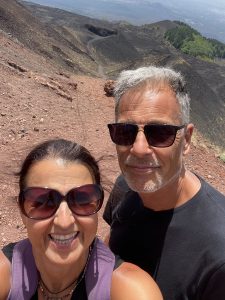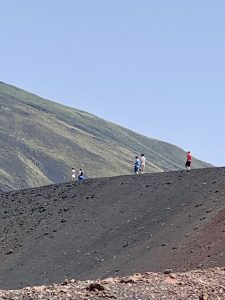Call free on: 0800 389 2839
Call free on: 0800 389 2839
Join in... The latest news and blogs from NEC
Experiencing Mount Etna: A Journey of Natural Wonders and Learning Monday, 15 July 2024

Written by NEC Chief Executive Esther Chesterman
As the CEO of the National Extension College, I often find myself engrossed in the world of education, striving to bring the best learning experiences to our students. However, nothing could have prepared me for the breathtaking and humbling experience of witnessing Mount Etna’s eruption up close during my recent holiday in Sicily. It was an awe-inspiring event that brought the raw power of nature to life and offered a unique opportunity to reflect on the importance of understanding our planet’s dynamic systems.

A Front-Row Seat to Nature’s Power
During our stay in Sicily, my family and I were fortunate enough to witness one of Mount Etna’s spectacular eruptions. Watching the molten lava flow and feeling the tremors beneath our feet was a reminder of the Earth’s immense power. The sight of incandescent lava fountains lighting up the night sky, accompanied by the deep rumble of the volcano, was nothing short of mesmerising. This encounter with one of the world’s most active volcanoes provided a profound sense of nature’s unpredictability and grandeur.
Geology Comes to Life
Adding to the richness of this experience was the presence of my son and his girlfriend, both of whom are geologists. Their expert insights into the geological processes at play enriched our understanding of what we were witnessing. They explained the mechanics of plate tectonics and the specific conditions that lead to volcanic eruptions, such as those we were observing at Etna. Their knowledge transformed what could have been a simple sightseeing event into an educational journey, deepening our appreciation of the forces shaping our planet.
Exploring the Craters of Mount Etna
The day after the eruption, we embarked on a journey to Mount Etna’s base camp. From there, we hiked around the craters, exploring the remnants of past eruptions and the various geological features that make Etna so unique. Walking on the volcanic rock, with steam still rising from fissures, was a stark reminder of the ongoing volcanic activity beneath the surface. This firsthand experience was both thrilling and educational, underscoring the importance of studying such natural phenomena.
The Importance of Studying Hazardous Earth
Experiences like these highlight the value of studying geology and earth sciences. Understanding volcanic activity is not just about satisfying curiosity; it’s crucial for mitigating risks and managing the impacts of natural hazards on communities. At the National Extension College, we offer an online A Level Geography course that covers topics like volcanic activity, plate tectonics, and natural hazards in depth. Our curriculum is designed to bring these topics to life, providing students with the knowledge to understand and respond to the dynamic processes of our planet.
Volcanic Statistics and Further Reading
To put this into perspective, there are approximately 1,500 potentially active volcanoes worldwide, with about 50 of them erupting each year. These eruptions can have significant impacts on the environment and human societies, making it vital for us to understand and prepare for such events. For those interested in learning more about Mount Etna and its eruptions, I recommend reading this informative article on Mount Etna.
Embracing the Power of Distance Learning
Our distance learning platform allows students to delve into these fascinating topics from the comfort of their homes, providing a flexible and comprehensive education in geography. By studying with us, students gain a deeper understanding of hazardous earth processes and how to manage their impacts, preparing them for future careers in geology, environmental science, and related fields.
In conclusion, my experience with Mount Etna was a powerful reminder of nature’s awe-inspiring capabilities and the importance of education in understanding these forces. At the National Extension College, we are committed to providing high-quality, accessible education that brings the wonders of our planet into the virtual classroom. Whether you’re passionate about geology or just curious about the world, our courses offer a gateway to explore and understand the dynamic Earth.
Thank you for reading, and I hope this inspires you to learn more about our incredible planet. Find out more about NEC courses here.
More stories
working at NEC
Uncategorized
- Balancing an A level with My Passion for Dance
- The Future of Art History: Why Study A level History of Art with the National Extension College?
- Why Study Physics?
- Embracing a New Path: Jill’s Journey from Online Learning to Career Success in Art History
- How Toby Found a Perfect Fit for His Passion: Online A level English Literature with NEC
Study Tips
Student Stories
- Balancing an A level with My Passion for Dance
- Passion and Academics: How Izzy Balances Full-time Musical Theatre Studies with Studying A level Physics
- How NEC Helped Kari’s Son Niko to Continue his A level Studies Despite Long-Term Illness
- Embracing a New Path: Jill’s Journey from Online Learning to Career Success in Art History
- How Toby Found a Perfect Fit for His Passion: Online A level English Literature with NEC
SFT
Results Day
- Resitting A level STEM Subjects: How to Turn Your Setback into a Stepping Stone for a Brighter Future
- Resits vs. Retakes: Understanding the Difference and Making the Most of Your Second Chance
- GCSE Results Day 2024: What to Do When You Didn’t Get the GCSE Results You Wanted
- GCSE Results Day 2024: Your Complete Guide
- A level Results Day 2024: Your Ultimate Guide to Success
Policy and Campaigns
- A Pathway to Success Beyond A levels: Why Level 4 and Level 5 Qualifications Matter
- Schools and Academies Show 2024: Insights for School Leaders
- Big Data and Educational Trends: Insights for Students and Schools
- University of Cambridge Institute of Continuing Education offers tuition fee bursary for NEC A level students
- Five study bursaries for state sector teachers to take online A level Classical Civilisation offered by The Classical Association
Podcast
Our Courses
- Balancing an A level with My Passion for Dance
- How NEC’s Inclusive Approach to Learning Design is Redefining Independent Learning
- NEC’s Learning Design: A Pathway to Success for Independent Learners
- Passion and Academics: How Izzy Balances Full-time Musical Theatre Studies with Studying A level Physics
- Why Study Psychology? – Key Benefits, Careers and What You’ll Need to Study Psychology at University
Lifelong Learning
- A Pathway to Success Beyond A levels: Why Level 4 and Level 5 Qualifications Matter
- Benefits of Homeschooling: Is Home Education Right for Your Family?
- How NEC’s Inclusive Approach to Learning Design is Redefining Independent Learning
- The Future of Art History: Why Study A level History of Art with the National Extension College?
- National Coding Week 2024: The Vital Role of Coding in the Modern World
Home Schooling
- Benefits of Homeschooling: Is Home Education Right for Your Family?
- How NEC Helped Kari’s Son Niko to Continue his A level Studies Despite Long-Term Illness
- Exploring Science Practicals at Home: A Guide for Homeschoolers
- Homeschooling in 2024: How to Personalise Your Child’s Education
- What is Homeschooling?
Guest Blogs
- Passion and Academics: How Izzy Balances Full-time Musical Theatre Studies with Studying A level Physics
- My Experience as a Marketing Intern with the National Extension College
- The economics of political parties
- Embarking on a journey: My decision to ‘Fast-Track’ A level Physics with NEC
- Homeschooler Andrew’s experience of studying IGCSE Chemistry
General
- Balancing an A level with My Passion for Dance
- A Pathway to Success Beyond A levels: Why Level 4 and Level 5 Qualifications Matter
- Schools and Academies Show 2024: Insights for School Leaders
- How NEC’s Inclusive Approach to Learning Design is Redefining Independent Learning
- NEC’s Learning Design: A Pathway to Success for Independent Learners


Add a new comment
Current comments: 0